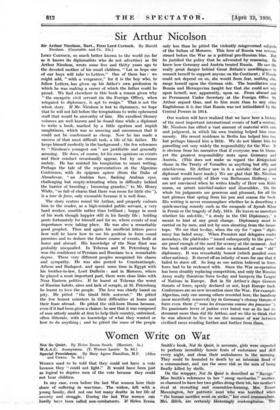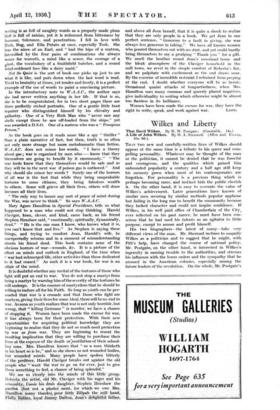Women Write on War
(Align and Unwin. 7e. 6d.)
WOMEN used to be told that they could not have a vote because they " could not fight." It would have been just as logical to deprive men of the vote because they could not bear children.
In any case, even before the last War women bore their share of suffering in war-time. The widow, left with a young family, died not one but many deaths in her life of anxiety and struggle. During the last War women cart hardly have been called non-combatants: If Helen Zenim
Smith's book, Not So Quiet, is accurate, girls were expected to perform incredibly heroic feats of endurance 'and skill every night, and clean their ambulances in the morning. They could be hounded to death by an inhturian fiend of a commandant, and ran the same risk as the men of being finally killed by shells.
On the wrapper, Not So Quiet is described as 7Savage." Miss Smith's references to her " smug saccharine " mother, so charmed to have her two girlies doing their bit, her mother's rival at recruiting and committee-forming, 'Mrs. Evans Maw-nhagton, her patriotic aunt who was horrified When " the human sacrifice went .on strike," her cruel commandant, Mrs. Bitch, arc certainly blisteringly contemptuous. the writing is as full of naughty words as a properly made plum 'duff is full of raisins, yet it is redeemed from bitterness by humour, tolerance, and penetration. I fell in love with Tosh, Bug, and Ella Potato at once, especially Tosh. She ;was the niece of an Earl, and " had the hips of a matron, intensified by the four pairs of combinations she always Wears for warmth, a mind like a sewer, the courage of a giant, the vocabulary of a Smithfield butcher, and a round wind-reddened face like a dairy maid."
Not So Quiet is the sort of book one picks up just to see what it is like, and puts down when the last word is read. Vivid to brutality at times, yet tender and lovely, it is a perfect example of the use of words to paint a convincing picture.
In the introductory note to the author says she had never written anything in her life. If that is so, she is to be congratulated, for in two short pages there are three perfectly etched portraits. One of a gentle little boot repairer who distinguished himself by his chivalry and gallantry. One of a Very Rich Man who " never saw any shells except those 'he saw off-loaded from the ships," yet -was awarded a D.S.O. One of a matron who was a " Pompous Person," As the book goes on it reads more like a spy " thriller " than a plain narrative of fact, but then, truth is so often not only more strange but more melodramatic than fiction. w.A.A.C. does not mince her words. " I have a theory about gas ; war is organized by men who—know that they 'themselves are going to benefit by- it enormously." " The war lords knew that they themselves would be safe and so they will be in the next war if poison gas is outlawed." And why should she mince her words ? Surely one of the horrors of all war is the fact that while they bring unspeakable tortures to some citizens, they bring fabulous wealth to others. Some will grieve all their lives, others will draw incomes all their lives.
" The only way to insure any sort of peace of mind during the War, was never to think." So says JV.A.A.C.
Mary -Agnes Hamilton in • Special Providence, tells us what happened to a man who could -not stop thinking. Harold Claviger, keen, clever, and kind, came back, as his friend Stephen Renshaw said, " emotionally, spiritually, dynamically, dead." " He is the one man I know, who knows what it is, 'you can't 'know that and live." As Stephen is saying these things, and trying to comfort Jean, Harold's wife, he unexpectedly returns and in a moment of misunderstanding shoots his friend dead. This book contains none of the obvious horrors of war—wounds, &c. It is a picture of the effect on minds and outlook in England, of the time when .` war had submerged life, other activities than those dedicated to it had ceased." As such it is a war book, for war is an affair of the mind.
It is doubtful whether any recital of the tortures of those who fight will put an end to war. You do not stop a martyr from being a martyr by warning him of the severity of the tortures he will undergo. It is the essence-of martyrdom that he should be willing to-endure all for hii Faith. SO long as youth can be per- suaded that war is a crusade and that those who fight are martyrs, giving their lives for some ideal; there will be no end to war. Al soon as youth realizes that war is not only horrible, but wrong, tluit "killing Germans" is murder; we have a chance of stopping it. Women have been made the excuse for war, it has ahrays been for their protection. With their new opportiMities for acquiring Political knowledge they are beginning to realize that they do not so much need protection by war as from war. They are beginning to resent the insulting implication that they are willing to purchase their lives at the expense of the death or:mutilation of their school- boy sons. Mrs. Hamilton knows that " as a man thinketh in his heart so is he," and so she shows us not wounded bodies, but wounded minds.. Many people have spoken bitterly of the profiteer, Harold Claviger breaks out against the old people who want the war to go on for ever, just to give them something to feel, a chance of being splendid."
We see so -clearly_ into the minds of this little group. Roberta the artist, old Mr. Claviger with-his rageti and his sensuality, Lassie his drab danghter, Stephen Renshaw the pacifist Out not a plaster saint, for which we owe Mrs. Ilitaillton many thanks), poor little Zillpsh the mill hand, Fluffy: tier, _loyal Jim,* Dalton, Jean's Cielightful father, and above all Jean herself, that it is quite a shock to realize that they are only people in a book. We get Jean in one perfect sentence, " Generous to a fault in giving, she was always less generous in taking." We have all known women who poured themselves out with no stint, and yet could hardly bring themselves to say a grudging " Thank you " for a gift. We smell- the heather round Jean's -moorland home and ' the bleak atmosphere of the Claviger household in t he mill town, we revel in the simple comfort of Roberta's flat, and we palpitate with excitement as the end draws near. By the exercise of incredible restraint I refrained from peeping at the end. I doubt whether everyone will be as heroic. Occasional quaint attacks of tonguetiedness, when Mrs. Hamilton uses many commas and queerly placed negatives, give individuality to writing which otherwise might be almost too flawless in its brilliance.
Women have been made the excuse for war, they have the
-right to write, speak, and work against war. L1SST.



























































 Previous page
Previous page